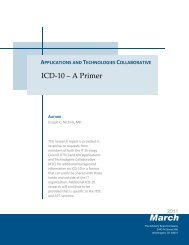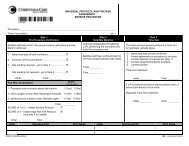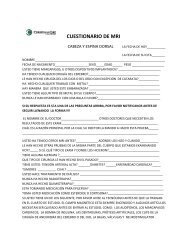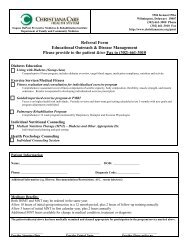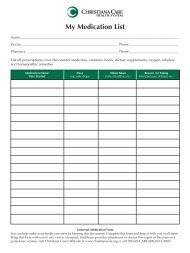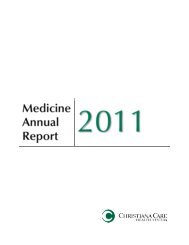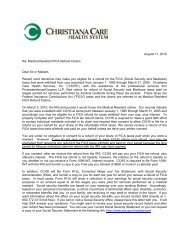Nutrition - Christiana Care Health System
Nutrition - Christiana Care Health System
Nutrition - Christiana Care Health System
Create successful ePaper yourself
Turn your PDF publications into a flip-book with our unique Google optimized e-Paper software.
Characteristics of the<br />
Mediterranean Diet<br />
Traditional Mediterranean meals feature foods grown all around the Mediterranean Sea. Easily adaptable to<br />
today's kitchens and busy lives, they include:<br />
1. Grains, vegetables, and fruits should be eaten at most meals,<br />
because they are important sources of vitamins, minerals, energy,<br />
antioxidants, and fiber. An eating pattern high in these foods promotes<br />
good health and weight control when consumed wisely.<br />
Grains. The majority of grains should be whole grains, such as wheat,<br />
oats, rice, rye, barley, and corn. These grains are best consumed in<br />
whole, minimally-processed forms. Refining and processing can remove<br />
many valuable nutrients including vitamins, minerals, and fiber.<br />
Vegetables. Vegetables are an important staple of eating patterns of<br />
peoples in all the countries bordering the Mediterranean Sea, providing<br />
valuable nutrients. These benefits are amplified because the vegetables<br />
are normally cooked or drizzled with olive oil. Raw vegetables are<br />
also a healthy vegetable option.<br />
Fruits. Whole fresh fruit is ever-present in the Mediterranean.<br />
No-sugar-added fruit juices provide only some of the same nutrition<br />
benefits as whole fruit, and attention to portion control and total<br />
calories is wise. Fruit "drinks" do not have the benefits of fruit juice.<br />
2. Olives and olive oil are central to the Mediterranean diet. Olives<br />
are universally eaten whole, and widely used for cooking and flavoring<br />
in the countries that border the Mediterranean Sea. Olive oil is the<br />
principal source of dietary fat used for cooking, baking, and for dressing<br />
salads and vegetables. Extra virgin olive oil is highest in health-promoting<br />
fats, phytonutrients, and other important micronutrients.<br />
3. Nuts, beans, legumes and seeds are good sources of healthy<br />
fats, protein, and fiber. They add flavor and texture to<br />
Mediterranean dishes.<br />
4. Herbs and spices add flavors and aromas to foods, reducing the<br />
need to add salt or fat when cooking. They are also rich in a broad<br />
range of health-promoting antioxidants, and are used liberally in<br />
Mediterranean cuisines. Herbs and spices also contribute to the national<br />
identities of the various Mediterranean cuisines.<br />
7



